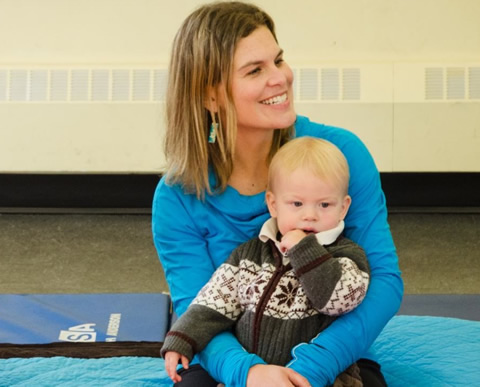Mary Elizabeth Picher (MEd 2013 OISE) is the co-founder and educational director of Wholeplay, which offers parent-child classes that combine music, dance and play activities for babies, and child-rearing tips and insights for moms and dads. She also offers consulting services in areas such as eating and sleeping habits, potty training, oppositional behaviour and giftedness. Picher – who is completing a PhD in developmental psychology and education at OISE – runs the service with a team of experts in psychology, social work, performing arts and more. She is also mom to a four-year-old boy and a two-year-old girl.
How did the idea for Wholeplay come about?
I worked at a mental health agency in Toronto running a program for women who had experienced domestic violence and were parenting a child under age 3. The purpose of the group was to educate women on how their trauma experiences might affect their relationship with their child. I started noticing that other mothers wanted to do the program because they were interested in child development, but I had to turn them away, because they didn’t fit our criteria. I decided I wanted to work more preventatively with families in a way where I could educate parents before negative experiences happened.
You offer classes for kids up to age 3 and their parents where you share clinical insights and evidence-based strategies for things like encouraging children’s self-esteem, introducing solid foods and promoting better sleep. How do you make this research data accessible and relevant?
It’s been a lot of trial and error. I realized early on that while I find the nitty-gritty of attachment parenting [a parenting style emphasizing breastfeeding, co-sleeping, soothing touch and more to form a nurturing connection with a baby] to be fascinating, not everyone wants that level of detail. If you’re too academic, you lose people. I learned how to convey the information in broad strokes, and in a way that is interesting and provides value without making it boring or difficult to understand.
Six years after launching Wholeplay, your classes are offered at 15 places in Toronto – from community centres to child-friendly cafés. Why do you think your approach resonates with new parents?
Moms and dads want a level of discussion about parenting that goes beyond what kind of diaper to buy, but they also want something fun and stimulating for their children. There isn’t much else available that combines these two things. Also, I think parents today are more interested in child development, partly because they can access so much information about it on the Internet. Another reason is that a lot people nowadays have no experience being around babies until they have one – so they approach parenting the way they approach everything else, through study and information.
How did your U of T education shape your thinking about child development and influence your parenting education methods?
In a course on child and adolescent development at OISE, we talked a lot about the influence of culture on child development. If I had not taken that class, I probably would not look at parenting in the same way. Successful or effective parenting looks different in different cultures, so there’s no one right way. It’s a message I try to instil from the beginning in our classes, so that parents don’t feel like they will be judged. I try to bring into the classes openness and a respect for diversity.
What are the biggest highlights of what you do?
I love working with parents and babies, and talking about parenting and child development…. What makes this successful for me is seeing how different families are from when they start to when they finish. The parents are so much more confident, relaxed and able to enjoy the experience.






